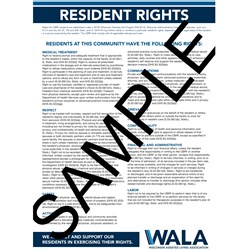Infection Control / Food Safety
Compliance Strategies Manuals
Infectious diseases have become a major concern in long-term care facilities in recent years. Infections are among the most frequent reasons long-term care residents get admitted to hospitals. According to the Centers for Disease Control, between one and three million serious infections occur every year in long-term care facilities. The basic principle of infection prevention and control is hygiene. Hygienic practices include hand hygiene, cough etiquette, food delivery, and management of laundry, waste, and equipment.
The Compliance Strategies in this manual will help you understand infection control practices, provide resources and tools that will support infection control in your community, as well as provide you with the practices to follow to educate residents and families about infection control and train and monitor your staff to make sure that infection control practices are followed.
Plus! You also get Food Safety Compliance Strategies!
As providers in assisted living communities, we have a responsibility to provide a safe and high-quality food service program. Food safety means establishing sound practices for purchasing, storing, preparing, cooking, serving, and cleaning up food. If a resident has had a chronic illness such as cancer or diabetes, the illness or its treatments can further weaken their immune system and increase their risk for contracting a food-borne-illness. If this resident contracts a food-borne illness, there is a chance the effects will be serious or even deadly.
The Compliance Strategies in this manual will describe food safety practices, teach you how to establish a culture of food safety in your assisted living community, and suggest training techniques for your staff when it comes to food safety.
View a sneak peek of the Table of Contents - Infection Control
View a sneak peek of the Table of Contents - Food Safety



